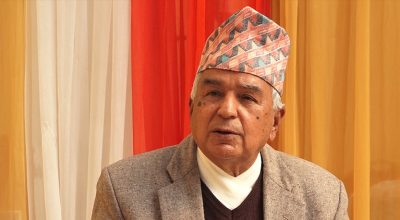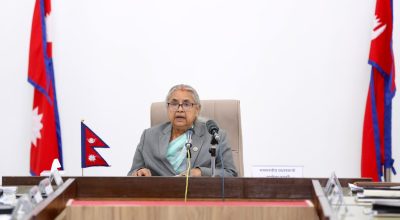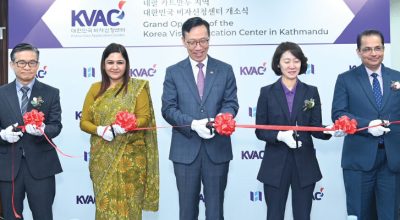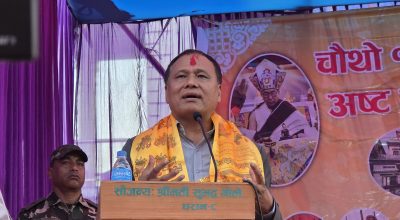
Prof Dr Rajiv Kumar Jha
Kathmandu, Oct 2: China is waiting for the implementation of bilateral agreements and memorandum of understandings with Nepal that took place during the recent official visit of Prime Minister of Nepal Pushpa Kamal Dahal ‘Prachanda’, said Dr Rajiv Kumar Jha, a Nepali professor in China.
“Shared commitments in the joint statement along with the agreements and memoranda of understanding along with reached between Nepal and China during the visit of PM Dahal to China are in the welfare and development of Nepal and they are good. However, China is also waiting for their implementation in the context when such agreements could not implement in the past,” said Prof Jha.
The cross border railway agreement reached during the visit of the PM is important for Nepal, he is of the view. “It does not take time for Beijing’s prosperity to reach Kathmandu if the Nepal-China cross border railway is constructed. Be them tourists or goods of China, they can reach Nepal in five or six days from any places of China. It is not enough for a landlocked country like Nepal to connect through the air. It will hugely benefit Nepal if it connects with the railway. China wants to bring the railway to Nepal. But for this, we are the ones who lobby diplomatically,” he said.
Recalling past agreements and memorandum of understandings reached between the two countries on the issue of connecting Nepal through the railway, he said this would additionally help in the development of the tourism sector of Nepal. If Nepal wants to take maximum advantages from the prosperity of neighbouring China, the most reliable option is the railway system, he said.
“Our trade deficit with China is huge. Our exports are negligible, but imports are high. In the future, the railway will be the route to export goods to China. In the agreements recently, China has pledged assistances in some agriculture seeds and animal husbandry. Similarly, an industrial park is being built. If productions are made in the future as per the agreements, they will be exported to China and for this, the railway is necessary.”
“In the agreement, China has committed to conducting research on medicinal herbs available in Nepal’s highlands and collaborating with Nepal for the further development of this sector,” he said, adding that presently Nepal exports herbs outside the country, but securing fair prices for these products has proven challenging.
Dr. Jha, who has been affiliated with Xi’an University of Medical Sciences for over two decades, said, “Nepal exports medicinal herbs at very low prices, while a significant quantity is being smuggled out of the country. In return, Nepal pays a substantial amount to import products manufactured using the same herbs as raw materials.”
As he assessed, herbs found in Nepal’s highlands are a top priority for China. These products are completely organic, and China’s objective with this project is to promote them.
According to him, the bilateral agreement to establish an industrial park has been applauded as an instrument serving the interests of both nations, with greater benefits for Nepal. The establishment of this park is likely to contribute significantly to promoting Nepal’s exports.
Taking reference of Cambodia, he said China has established two such parks there and they have been helpful in boosting the Cambodia’s economy.
Talking to RSS on conclusion of PM Dahal’s official visit to China, Prof Jha who has been watching the Nepal-China relations closely since the last two decades said the agreement of setting up the Madan Bhandari Science and Technology University is another achievement.
“Forthcoming development is possible only through the promotion of science and technology. What is development? At present, the robot cooks food and serves it in several restaurants in China. China is reducing on its labour force through the development of such types of technology,” Jha said, adding that development now did not refer only to roads, water supply and electricity, but it encompasses development of science and technology as well.
According to him, Nepal is entering the field of IT just recently and the technical human resources to be produced from this university in the coming days can change the face of Nepal. We need universities centered on information, science and technology in the coming days, he stressed.
As Prof Jha said, the Chinese side is ready to extend cooperation to Nepal. However, Nepal should also not have the thinking that another country will come and develop it. According to him, China assists Nepal in carrying out development projects and it is up to us to benefit from their prosperity and development through these projects.
He said the Chinese always looked back at the agreements and understandings reached before this. Prof Jha said this is not only in the case of Nepal, but the Chinese have this expectation with all countries with which they have established diplomatic relations or to those they have provided support.
Therefore, it is for Nepal to create the environment for the implementation of all the MoUs and agreements signed with China during the state visit of Chinese President Xi Jinping to Nepal in 2019, he said and suggested that Nepal should build the capacity of enforcing the agreements and MoUs signed during Prime Minister Dahal’s recent visit to China, which are contained in the joint press release. RSS














